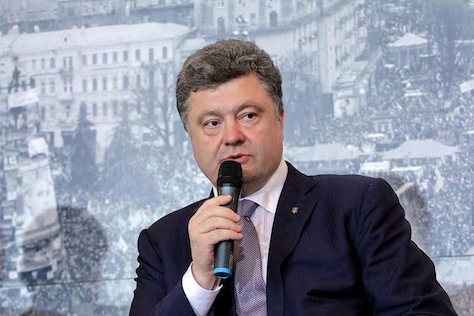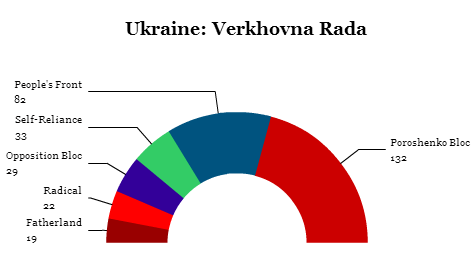Since most of the pro-Russian parts of Ukraine are still engaged in a low-grade revolt against Kiev’s pro-Western government, it’s not a surprise that the results of October 26’s snap parliamentary elections were good news for pro-Western parties.![]()
The message of the parliamentary election isn’t quite as awful as ‘Ukraine is doomed,’ but it’s hard to take away a lot of comfort that the troubled country is on the right path to political unity and economic progress.
With turnout across eastern Ukraine depressed, most acutely in Donetsk and Luhansk, it makes sense that Ukraine’s new president emerged with the largest number of projected seats in Ukraine’s unicameral parliament, the Verkhovna Rada, after Sunday’s elections.
The Petro Poroshenko Bloc (Блок Петра Порошенка) formalizes the electoral alliance that Poroshenko made prior to the May 25 presidential election with heavyweight boxing champion Vitali Klitschko, who was elected Kiev’s mayor earlier this year.
But the new government of Ukraine will invariably look much like the old one — a coalition between Poroshenko and former prime minister Arseniy Yatsenyuk, whose resignation triggered the snap elections earlier this summer. Then, as now, it’s something of a mystery why new elections were so pressing when Kiev is still struggling to regain control of the eastern regions from pro-Russian separatists.
* * * * *
RELATED: Is Yatsenyuk’s resignation good or bad news for Poroshenko?
RELATED: Can Poroshenko deliver his fairy-tale promises to Ukraine?
* * * * *
Yatsenyuk’s bloc, the People’s Front (Народний фронт), won more absolute votes, according to preliminary results, and another new bloc, Self Reliance (Самопоміч, ‘Samopomich‘), the vehicle of Lviv mayor Andriy Sadovyi emerged as the surprisingly strong third-place winner.
Though some sort of Poroshenko-Yatsenyuk coalition seems the likeliest outcome, the two rivals are already sniping over which bloc should lead the coalition talks.
Former prime minister and presidential candidate Yulia Tymoshenko’s ‘All Ukrainian Union — Fatherland’ party (Всеукраїнське об’єднання “Батьківщина, Batkivshchyna) also exceeded the 5% threshold for representation in the parliament, despite the fact that Yatsenyuk bolted Tymoshenko’s party to form his own. Preliminary results, however, showed that right-wing nationalist All-Ukrainian Union ‘Svoboda’ (Всеукраїнське об’єднання «Свобода») did not surpass the 5% threshold, meaning that it could lose many of the seats that it won in the 2012 election.
The mixed results mean that Poroshenko’s gambit to win a commanding parliamentary majority failed. The fragmentation of the ostensibly pro-Western parties might even make Ukrainians nostalgic for last decade’s feud between Tymoshenko and former president Viktor Yushchenko.
It’s hard to believe that Poroshenko, a businessman who played both sides of Ukraine’s Janus-faced divide between Europe and Russia, and who is backed by some of Ukraine’s most notorious oligarchs, will command an unruly set of allies into implementing the kind of liberalization that could give Ukraine a chance at dynamic economic growth, let alone real progress in integrating Ukraine’s economy into the greater European economy. That would be hard enough if Ukraine didn’t already face a severe depopulation crisis and frayed ties with Russia, which annexed Crimea in March and which continues to foment the destabilization of the pro-Russian east.
Pro-Russian Ukrainians, for what it’s worth, were essentially disenfranchised by the fighting in Donetsk and Luhansk oblasts, meaning that the new parliament’s composition will skew more ‘Western’ than a truly representative vote might otherwise warrant, despite the success of the Opposition Bloc (Опозиційний блок), a splinter group from the ashes of the old Party of Regions that supported the now-deposed former president Viktor Yanukovych. Ukraine’s Communist Party (Комуністична партія України) failed to reach the 5% hurdle as well, which is almost certainly a direct result of much-reduced turnout in the east. None of this inspires confidence that the parliamentary elections, or anything that’s followed the installation of the Yatsenyuk-led interim government in February, are quite fully legitimate.
Earlier this summer, it seemed like Poroshenko’s chief competition would be the the Radical Party (Радикальна Партія), led by Oleh Lyashko, a populist gadfly who zigs and zags between the most popular positions of the day. It fell to fifth place, however, which is probably one of the highlights of the election results, because Lyashko represents exactly the kind of old-school demagoguery that has held back Ukraine’s development.
But with the country still dependent on Russian supplier Gazprom for natural gas, it could be a bitterly cold and long winter ahead. Ultimately, triage to end the low-grade war in the east and to restore some kind of stability to the country will take a higher priority than the reform efforts that Ukraine also desperately needs.


